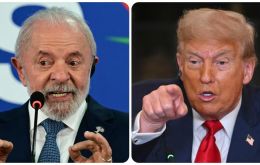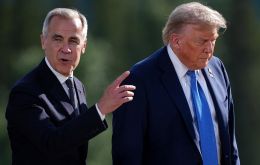MercoPress. South Atlantic News Agency
Tag: Tariffs
-
Tuesday, February 24th 2026 - 12:14 UTC
Trump’s tariff uncertainty adds pressure on the dollar after Supreme Court ruling

A fresh round of tariff moves announced by U.S. President Donald Trump has reintroduced market volatility and added pressure on the dollar, as investors and banks debate whether the currency is losing part of its traditional safe-haven role.
Add your comment! -
Monday, February 23rd 2026 - 12:41 UTC
Italy seeks “clarity” from the US, urges calm amid renewed tariff uncertainty

Italian Foreign Minister Antonio Tajani said on Monday he would seek “clarity” from the United States during a G7 videoconference on international trade and urged restraint as Washington’s latest tariff moves inject fresh uncertainty into transatlantic commerce.
Add your comment! -
Sunday, February 22nd 2026 - 00:10 UTC
Trump raises new global tariff to 15% a day after setting it at 10%

US President Donald Trump said on Saturday he will lift the temporary “global” tariff his administration unveiled just a day earlier from 10% to 15%, after the Supreme Court struck down his broader tariff program. The shift requires amending the proclamation and related measures issued on Friday.
Add your comment! -
Saturday, February 21st 2026 - 04:34 UTC
Trump vows new 10% global tariff after Supreme Court curbs emergency levies

US President Donald Trump lashed out at the Supreme Court hours after it curtailed his ability to impose sweeping tariffs under emergency powers, and signaled he intends to press ahead with his trade strategy. “I’m ashamed of certain members of the court, absolutely ashamed,” he said at the White House.
Add your comment! -
Friday, November 21st 2025 - 10:58 UTC
Trump removes 40% tariffs from 212 Brazilian items

US President Donald Trump has removed a 40% tariff on more than 200 Brazilian agricultural and livestock products, including beef, vegetables, coffee, cocoa, and some ammonia-based fertilizers. The decision follows negotiations with Brazilian President Luiz Inácio Lula da Silva.
-
Friday, August 8th 2025 - 10:01 UTC
UN Chief finds Trump's tariffs “disheartening”

UN Secretary-General António Guterres has expressed that the new tariffs imposed by U.S. President Donald Trump are “disheartening.” Through his spokesperson, Farhan Haq, Guterres reiterated his long-held belief that “trade wars are ruinous and need to be avoided.”
-
Thursday, August 7th 2025 - 10:33 UTC
Lula slams Trump over Brazil tariffs, accuses Bolsonaro of betrayal

Brazilian President Luiz Inácio Lula da Silva harshly criticized U.S. President Donald Trump following the implementation of a 50% tariff on Brazilian exports. Lula called Trump “authoritarian” with “anti-civilizational” behavior and accused him of creating “problems where there were none.”
-
Monday, August 4th 2025 - 10:42 UTC
Lula says Brazil deserves to be treated with pride and sovereignty

President Luiz Inácio Lula da Silva said his country intended to negotiate the 50% tariff imposed by US President Donald Trump, albeit with pride and sovereignty, highlighting Brazil's strong ties with other nations that would allow for a reduced dependence on the US.
-
Friday, August 1st 2025 - 09:22 UTC
Trump announces 35% tariffs on Canadian products

US President Donald Trump has raised the tariff rate on Canadian imports from 25% to 35%, effective August 1. The White House justified the increase by stating that Canada has not done enough to “arrest, seize, detain or otherwise intercept... traffickers, criminals at large, and illicit drugs.” Trump also announced Thursday a 90-day moratorium with Mexico after a call with President Claudia Sheinbaum, keeping 25% tariff rates in place.
-
Thursday, July 31st 2025 - 09:34 UTC
Chile dodges US's 50% tariffs on copper

US President Donald Trump's 50% tariff on copper imports will not apply to Chile's primary export to the United States: refined copper cathodes. This decision, announced in a White House proclamation, has been met with relief and celebration by officials in Santiago.
